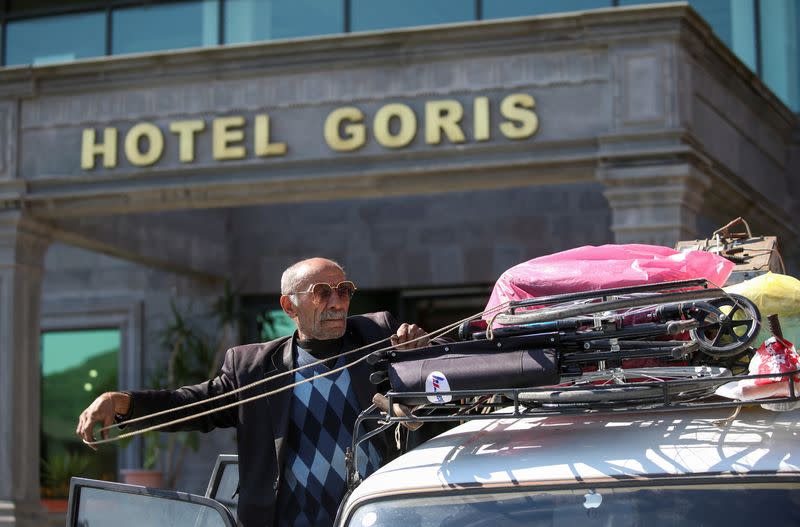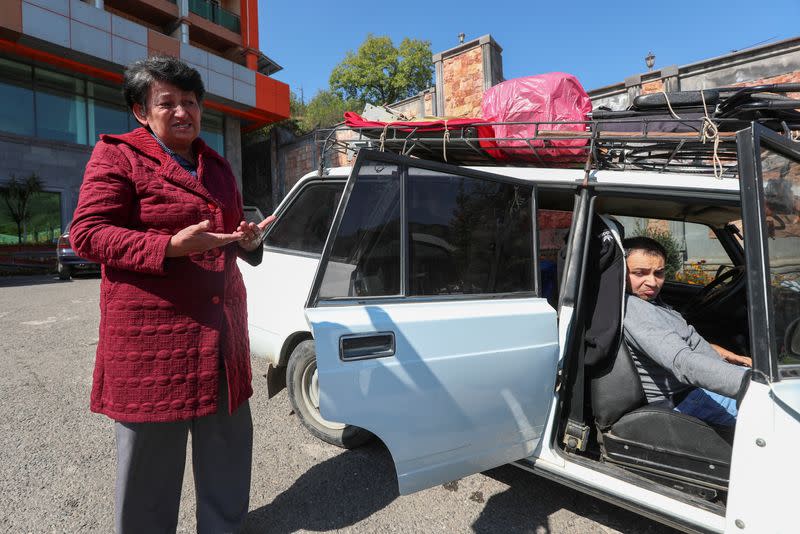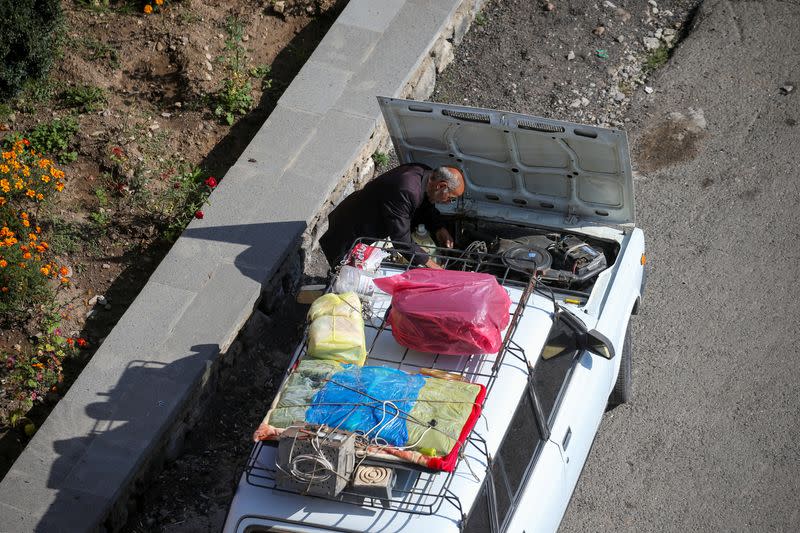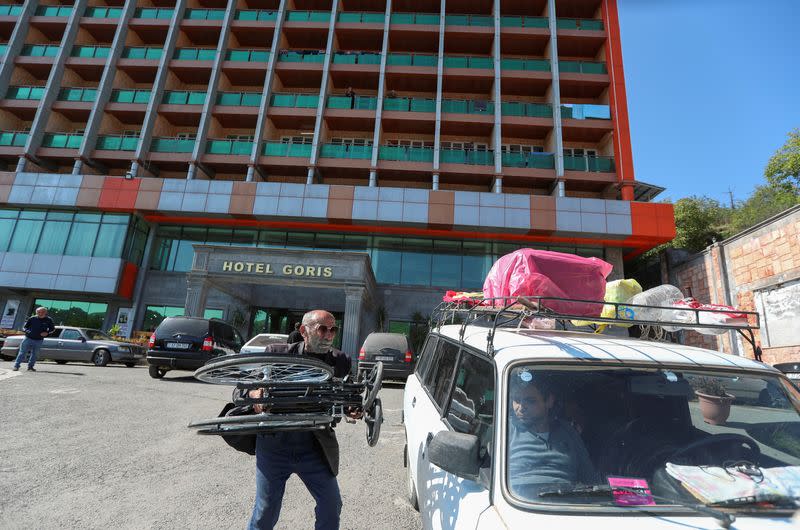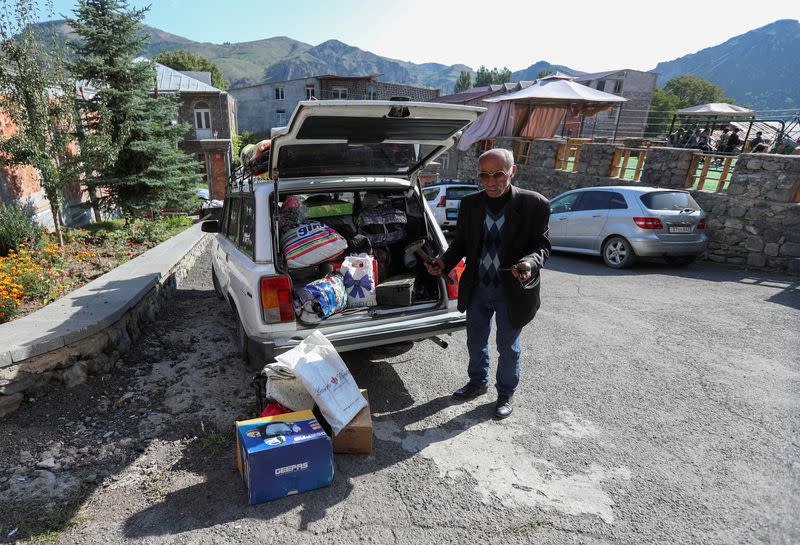Fleeing Karabakh, elderly couple fear for the future with their disabled son
By Felix Light
GORIS, Armenia (Reuters) - Albert Petrosyan strapped his son's wheelchair and a few bags to the roof of his ancient Russian-made car ahead of another long drive after fleeing his home in Nagorno-Karabakh this week and spending just one night in a hotel in this Armenian town.
Petrosyan, 71, his wife Geghetsik, 65, and their 30-year-old son Agasi, who uses a wheelchair and has severe learning difficulties, are among more than 70,000 ethnic Armenians to have fled Karabakh so far since Azerbaijani forces retook the mountainous region last week in a lightning offensive.
"We will never return (to Karabakh). We'll never be able to," said Petrosyan, a retired mechanic. "It's impossible to live with Azeris."
Ethnic Armenian authorities in Karabakh said on Thursday they were dissolving the breakaway statelet they had defended for three decades. Karabakh is viewed internationally as part of Azerbaijan, but is populated mainly by ethnic Armenians.
Azerbaijani President Ilham Aliyev has promised to protect the rights of Karabakh's 120,000 Christian Armenians but most are expected to leave due to deep-rooted ethnic enmity with the mainly Muslim Azeris, exacerbated by memories of war in 1988-94 and again in 2020, when Baku's forces retook parts of Karabakh.
HOME ABANDONED
Petrosyan said his family had been pushed to the limit over the past 10 months due to an Azerbaijani blockade of Karabakh that had led to chronic shortages of food, fuel and medicines
"A pack of cigarettes cost five thousand dram ($12) and you could hardly find them," he said. "The shops were empty."
After last week's Azeri victory, Petrosyan crammed his Zhiguli estate car with as much as he could, including the toolbox he had used to make a living, and the family began the 77-km drive to the border over two days along with tens of thousands of other frightened refugees.
Abandoning their four-room house and 1,000 square metre plot of land in Stepanakert, the capital of Karabakh, was very hard.
"We built our home so that everything would be nice for him (their son)," said Petrosyan's wife Geghetsik, through tears. "I won't be able to find a flat now that will be good for him."
Armenia has made hotel accommodation available in Goris and other towns for the refugees, but Petrosyan said they would move on, first to Armenia's capital Yerevan, but were unlikely to stay there as his 61,000 Armenian dram ($157) monthly pension would not be enough to live in the city.
He said they would probably stay with relatives who live in a village near Lake Sevan in central Armenia.
Armenia has blamed its ally Russia, preoccupied with the war in Ukraine, for not doing anything to help stop the Azeri offensive.
But Petrosyan said he believed Turkey, a close ally of Azerbaijan with which it shares close linguistic and cultural ties, was ultimately behind the defeat of the Armenian state in Karabakh.
"It's the Turks' policy. They wanted to kick us out," he said.
Armenia, backed by historians and the parliaments of many countries, says mass killings of Armenians by Ottoman Turks during World War One amounted to genocide, a charge strongly denied by Turkey.
Turkey's President Tayyip Erdogan, who backed Azerbaijan's offensive, has called for a comprehensive peace treaty between Armenia and Azerbaijan.
(Writing by Gareth Jones; Editing by Ros Russell)
